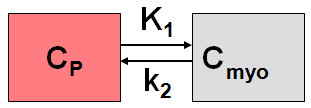Van den Hoff et al. [1] have investigated and validated 11C-acetate as a flow tracer. This methodology is implemented as the Card Acetate (1 Compartment) model. It employs a single tissue compartment model

with tracer exchange between arterial plasma CP(t) and myocardial tissue Cmyo(t).
Operational Model Curve
The differential equation Cmyo(t) is given by

K1 is the product of flow F and extraction E
![]()
For acetate, the extraction is flow dependent [1]

Furthermore a metabolite correction is necessary to derive the plasma activity from whole blood measured in the left cavity [1]

with T1/2=5.3 min. Including these relations into the differential equation yields
![]()
which is non-linear in F. The model curve incorporates a cardiac dual spillover correction, resulting in the operational equation
![]()
where
VLV = spill-over fraction of the blood activity in the left ventricular cavity CLV(t),
VRV = spill-over fraction of the blood activity in the right ventricular cavity CRV(t)
Implementation
When using the model from the PCARD module, the data are transferred appropriately. When using it in PKIN the blood data have to be loaded as follows:
The following automatic adjustment is performed within the model:
Parameter Fitting
The model includes the 4 fitable parameters F, k2, vLV, vRV. Please inspect the %SE standard error to get information about the reliability of the parameter estimates. The parameters for the correction of the flow-dependent extraction (EF scale, EF exp) and the metabolites (MC scale, MC T12) are initialized with the published values [1], but can be edited if needed. The K1 parameter of the 1-tissue compartment model equivalent to the EF product is provided as s macro parameter.
Reference
1. van den Hoff J, Burchert W, Borner AR, Fricke H, Kuhnel G, Meyer GJ, Otto D, Weckesser E, Wolpers HG, Knapp WH: [1-(11)C]Acetate as a quantitative perfusion tracer in myocardial PET. J Nucl Med 2001, 42(8):1174-1182. PDF